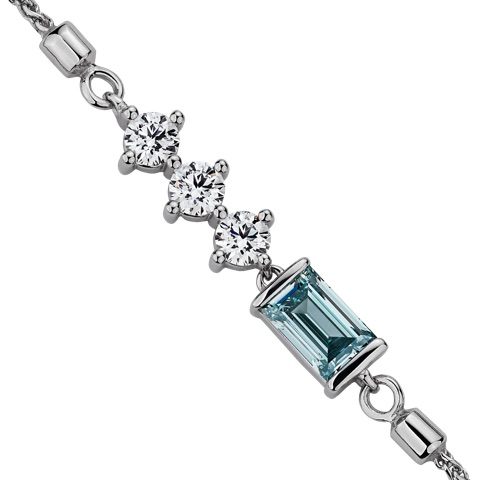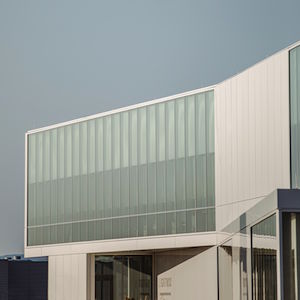
Lightbox, De Beers’ lab-grown diamond brand, began selling its products on e-tailer Blue Nile on Thursday, the same day it officially opened its diamond-producing factory in Gresham, Ore.
Blue Nile will sell the product not just domestically but in the 44 countries where it has a presence—marking the first time that Lightbox has sold its wares beyond the United States and Canada. Lightbox product will also be displayed in Blue Nile’s expanding fleet of showrooms—it currently has eight—though its stores don’t actually sell product, but rather guide customers to the company’s website.
Blue Nile will sell both standard Lightbox offerings, like ear studs, as well as some new designs that are exclusive to the site. As is customary for Lightbox, all stones will be 1 ct. or under and sell for $800 a carat.
There will be some differences, however: The Lightbox pieces sold on Blue Nile will only use 14k gold, while Lightbox’s site also includes a 10k gold option. In addition, the Blue Nile offering will start at $600 and go up to $1,750, says CEO Sean Kell. Lightbox’s offerings start at $250 and top off at $1,000. The Blue Nile x Lightbox collection can be seen here.
This is the first time Blue Nile has sold lab-grown diamonds in its two-decade history, though, like Lightbox, it isn’t using them as bridal pieces.
But Kell hopes that customers will see its Lightbox assortment as an ideal gift for the holidays.
“We have the jewelry side and the bridal side of the business, and we’re really focusing on the jewelry side,” he says. “Historically, we’ve been really focused on classic diamond jewelry, so this is really the first time, at least in recent memory, that we’ve done anything a little more fashionable, with an on-trend premium product line.”
He says that the Seattle-based e-tailer is already looking at possible extensions, including possibly recruiting well-known designers to produce pieces.
And while Blue Nile’s core bridal offering generally requires customers to spend time speaking with its customer service staff—about one-half of the company’s transactions involve a phone call—Lightbox purchases will be more of a traditional click-and-buy–type transaction.
“This is meant to be an amazing product that shows up brilliantly on our website—that you can essentially, with a couple of clicks, purchase a premium product at a great price as either a self-gift or a gift for a loved one,” Kell says, noting that customers always have the option to talk with diamond consultants if they want.
Kell adds that Blue Nile and Lightbox hope to work together on co-marketing initiatives.
The news comes as Lightbox officially opens its $94 million custom-designed production facility in Gresham, Ore. The 60,000-square-foot factory is meant to reach full production capability—200,000 polished carats a year—by the end of the first quarter of 2021. The COVID-19 pandemic probably delayed its opening about “three to six months,” says Lightbox CEO Steve Coe.

“We didn’t stop anything, but we just had to slow down some of the commissioning work because of the need for social distancing,” he says. “It was a much more gentle ramp-up than we originally thought.”
In October, Lightbox placed product in 28 retailers, and Coe says it will soon add more to that list.
“With our Oregon facility coming online, we are going to have to ramp up our distribution,” Coe says. “We will have 200,000 polished carats coming out of that facility when it’s fully up and running, so inevitably we are going to be working with more retailers. That includes online, but the plan is very much to work with more brick-and-mortar retailers in the future.
“Before now, we’ve been largely constrained by material supply,” he adds. “With Oregon coming online now, that really solves that problem for us, and it enables us to go forward now and grow the business.”
He calls Blue Nile an “ideal partner” for the brand.
“They have been in e-commerce for a long time,” he says. “Don’t lose sight of the fact that, although Lightbox is high-profile within the industry, it’s still in the very early days as far as engaging with consumers. I think any additional distribution channel that helps us build our brand is positive.”

Coe says the “state of the art” facility may start producing larger, better-quality, and possibly even cheaper diamonds.
He notes that lab-grown diamond prices have been falling in general, and says that he’s seen some companies sell lab-grown diamonds with prices that come close to Lightbox’s initially shocking $800-a-carat price scheme.
He adds that it’s possible that some of the new Oregon production could be used for “private label” brands.
“Our primary focus will be on obviously our own internal e-commerce platform and wholesale supply,” he says. “We will have to see what opportunities arise.”
Top: A Blue Nile x Lightbox bracelet with blue lab-grown diamonds (images courtesy of Lightbox)
Follow JCK on Instagram: @jckmagazine
Follow JCK on Twitter: @jckmagazine
Follow JCK on Facebook: @jckmagazine